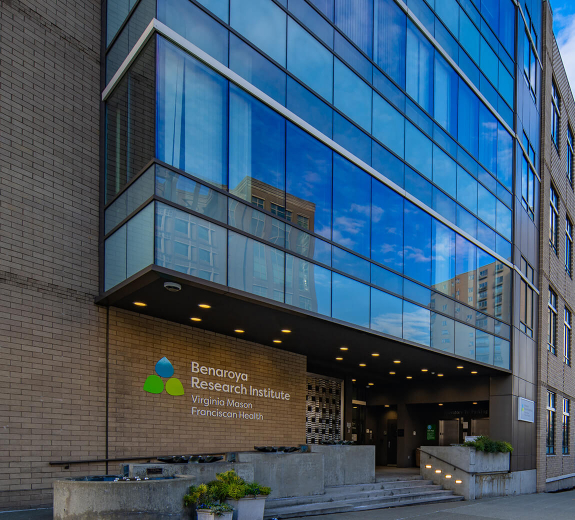Multi-Million-Dollar Grants to Propel Groundbreaking Studies on Immune Dysregulation and Autoimmunity in People with Down Syndrome
Today, Benaroya Research Institute (BRI) announced eight new awards received in the past two months, totaling over $9 million in funding to go toward their research of the human immune system — the majority of which will support an ongoing and increased focus into the immune systems of individuals with Down syndrome (DS). This meaningful investment in DS research allows BRI to remain at the forefront of discoveries that will improve the lives and health outcomes of people with DS.
BRI’s focus on DS grows out of the work of Bernard Khor, MD, PhD, whose research assesses the biological roots of immune dysregulation in people with DS. In 2022, Dr. Khor’s group found that the immune systems of people with DS exhibit signs of aging. In fact, their immune systems can appear up to 17 years older than expected from their actual age. Dr. Khor’s recent R01 grant (R01AI166835-01A1), received at the end of 2022, has allowed scientists at BRI to work to better understand what’s driving this immune aging in people with DS.
“As it turns out, people with DS have a lot of adverse health outcomes that are related to immune dysregulation, including a four-to-six times higher likelihood of developing autoimmunity, a higher risk of infection, and lower response to vaccination,” said Khor. “Our work looks at why that is — both to improve the lives of people with DS and in hopes that the learnings from this work will be translatable to other populations.”
Now, with the receipt of three additional new awards totaling over $7.5 million—including an Immune Drivers of Autoimmune Disease (IDAD) grant—to continue studying DS, BRI is equipped to become a hub of knowledge about how immune dysregulation in people with DS drives a heightened likelihood for disease. Conversely, the lessons learned from people with DS will direct a better understanding of the mechanisms that drive immune aging and autoimmunity.
The IDAD grant will power researchers across labs at BRI to assess the genetic, molecular and environmental factors that drive the transition from pre-autoimmunity (before onset of clinical symptoms) to autoimmune disease. The group, led by principal investigators Jane Buckner, MD, and Alice Long, PhD, will compare samples from individuals at risk for type 1 diabetes and those with DS at risk for autoimmune disease. This work will draw from BRI’s robust biorepositories — a library of blood and tissue samples from healthy volunteers and individuals with various immune system diseases.
“Collaboration defines our work ethos at BRI, which stems from our understanding that advances in one disease area will translate across to others,” said Jane Buckner, MD, president of BRI and co-principal investigator on the grant. “To have NIAID fund this comparative research will vastly improve our understanding of the precursors to autoimmune disease.”
This award was partially funded by the National Institute of Health’s INCLUDE (INvestigation of Co-occurring conditions across the Lifespan to Understand Down syndromE) Project, an enormous collective effort to investigate health conditions that affect individuals with DS.
Details of the eight grants awarded to BRI in the past two months include:
T cells promoting transitions toward autoimmunity
Jane Buckner, MD, and Alice Long, PhD
$6,486,351
Sponsor: National Institute of Allergy and Infectious Diseases (U01AI176320)
This research will assess the genetic, molecular and environmental factors that drive the transition from pre-autoimmunity to autoimmune disease, using samples from both individuals at risk for type 1 diabetes and individuals with Down syndrome at risk for developing autoimmune disease.
Anti-tumor and autoimmunity signatures in Down syndrome
Jane Buckner, MD
$648,776
Sponsor: National Cancer Institute and NIH Office of the Director (3R01CA231226-05W1)
This grant will investigate why individuals with Down syndrome are at increased risk for autoimmune disease but are protected from developing solid tumors.
Investigating monocyte dysfunction in Down syndrome
Jessica Hamerman, PhD
$383,657
Sponsor: National Institute of Arthritis and Musculoskeletal and Skin Diseases and NIH Office of the Director (3R01AR076242-05S1)
This work will seek a deeper understanding of the innate immune alterations seen in Down syndrome.
Mechanisms of IL-2-mediated immune tolerance
Dan Campbell, PhD
$476,575
Sponsor: National Institute of Allergy and Infectious Diseases (R21AI172140)
This research will test a further hypothesis about a previously developed IL-2 mutein, aiming to understand the implications for potential future therapeutic use.
Identifying autoimmune associated genes in patrolling monocytes that promote lupus nephritis
Jessica Hamerman, PhD, and John Ray, PhD
$476,575
Sponsor: National Institute of Allergy and Infectious Diseases (R21AI178562)
Researchers will identify genes that control monocyte accumulation in the kidneys during lupus nephritis, suggesting potential future therapeutic targets.
Identification of novel targets in a unique subset of Tregs for therapies for colorectal cancer
Kazushige Ninomiya, PhD
$299,850
Sponsor: Andy Hill CARE Fund (FY23-LS-03)
The project will investigate a new treatment for colorectal cancer that may be appropriate for the general population, without requiring invasive surgery.
Development of treatment for colorectal cancer targeting on TSLPR+ST2+Treg
Kazushige Ninomiya, PhD
$100,000
Sponsor: Washington Research Foundation
Researchers will develop antibodies to target a recently identified, unique subset of regulatory T cells to develop a treatment for colorectal cancer.
LITAF regulation of cell death and inflammatory responses
Adam Lacy-Hulbert, PhD
$299,631
Sponsor: National Institute of Allergy and Infectious Diseases (R56AI168995)
The project will investigate cell mechanisms for detecting cell membrane damage and triggering repair processes.
For more information on BRI and its research efforts, visit benaroyaresearch.org.
For more information about donating to one of BRI’s biorepositories, visit benaroyaresearch.org/our-research/biorepositories.



